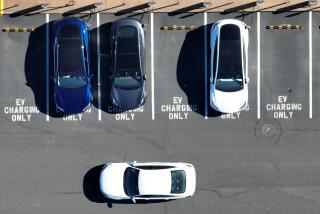Iraq budget focuses on public works projects
Iraqi Prime Minister Nouri Maliki is proposing a $7.4-billion boost in public spending next year in an aggressive budget designed to stimulate industry and speed up repairs of this country’s tattered roads, sewers and utilities.
It would also give more fiscal power to the country’s 18 provinces by increasing their budgets more than 50% on average.
The increased spending, which raises Iraq’s annual budget to $48 billion, would largely be financed by a projected 12% increase in oil revenue as well as funds that were not spent last year because of inefficiency.
The budget’s optimism is driven in part by the expectation that oil prices, now at record levels, will stay high. In addition, Iraq’s crude production, which dipped this year, has rebounded since August, climbing slightly above the target of 2.1 million barrels a day, according to a U.S. State Department report.
The Times obtained a copy of the budget, which, though not yet public, has circulated among Iraqi and U.S. officials.
At a recent reconstruction conference, U.S. Ambassador Ryan C. Crocker praised Finance Minister Bayan Jabr’s ambitious investment in economic development, despite what he said were objections by the International Monetary Fund.
“Mr. Minister, the IMF may have a few problems with your budget, but I can tell you that I don’t, and I know the people of Iraq don’t either,” Crocker said.
The budget, which will be discussed by parliament Sunday, would raise overall spending by 18% and set some clear priorities.
Spending on social programs, education and healthcare, which together account for about 10% of the budget, would stay flat or gain only moderately, in effect losing ground to other faster-growing ministries.
The budget includes hefty proposed increases for the Defense and Interior ministries. Budgeted to receive $9 billion, the ministries overseeing the army and police eat up nearly 19% of proposed spending, reflecting security’s high priority.
In addition, a new national intelligence agency would be allocated $83 million and a new directorate for disarming militias $70 million.
Capital projects would grow by nearly a third. Funding for government-owned factories, which account for about 70% of Iraq’s industrial base and mostly stand idle, would grow fivefold.
The emphasis on government-owned factories and public works represents a shift away from privatization and stringent monetary policy favored by the IMF, said Kenneth M. Pollack, an Iraq specialist with the Brookings Institution in Washington.
“It might not make sense to an economist looking at how would the Iraqi economy best fit into the global economy, but would make sense in respect to Iraq’s labor markets,” Pollack said.
It gets people working and provides for basic needs, he said.
“A lot of what they need is sanitation, clean water, sewers, dredging of irrigation canals,” Pollack said.
Ministries that support business activity generally also would see large increases in spending: Funding for trade is to rise 40%, communications 54% and transport 67%.
Smaller items in the budget give some clues to how the government leans on some hot-button issues.
The budget nearly doubles the allocation to the Iraqi Special High Tribunal, which oversaw the trials of former President Saddam Hussein and several of his aides, suggesting more trials to come arising out of the deposed regime’s bloody campaigns against Kurds and repression of Shiite Muslims.
The budget for the Ministry of Displacement and Migration, which pays travel expenses for returning refugees and helps them become reestablished, would grow by 25%.
The government reported this week that 1,600 Iraqis are returning daily from neighboring nations. It is estimated that more than 2 million Iraqis left the country and 1.5 million more have been displaced internally as a result of sectarian strife and economic dislocation.
Funding for the Commission for Public Integrity, charged with investigating the government corruption that outside financial interests consider one of the gravest obstacles to economic recovery, would be cut by 6%.
Religious endowments, which provide social services, run religious schools and maintain religious properties, all grew, but at different rates. Funding for the Shiite endowment would grow by 235%, a nearly 5-to-1 increase compared with allocations for Sunni Muslim and Christian groups.
Several key ministries would take steep cuts, however.
Rashid Azzawi, a member of parliament from a leading Sunni Arab bloc, said his group would lose out because it was unable to spend its budgets in previous years.
“The reason is that those people in charge were not efficient,” Azzawi said. “It is true that security was not good, but also it’s because those people in office were there because of the ethnic and sectarian quota.”
--
Special correspondents in Baghdad contributed to this report.
More to Read
Start your day right
Sign up for Essential California for news, features and recommendations from the L.A. Times and beyond in your inbox six days a week.
You may occasionally receive promotional content from the Los Angeles Times.







